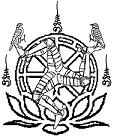As an elephant in battle withstands the arrow strikes from a bow;
I endure abuse, from the masses of people of poor morality.
321.
Leading the tamed (elephants) to the assembly, and the king mounts the (best) trained.
Best among tamed people, are those who endure abuse.
322.
Excellent are trained mules, and thoroughbred horses,
and noble tusker elephants; but far better are they who has trained themselves.
323.
Indeed not by these vehicles, could one get to the inaccessible land (Nibbàna).
As those who are well trained1, get there through their mastery2 of the training.
324.
The elephant named dhanapālo3, who is uncontrollable when in musth,4
Imprisoned he eats no food, recollecting the elephant forest.
325.
Whenever being lazy and gluttonous, tired and rolling about.
Like a great hog fed with fodder, stupidly they are reborn again and again.
326.
Formerly this mind wandered as it liked, wherever the sensual pleasure and happiness lay.
Today I restrain it with wisdom, like a mahout an elephant in musth.
327.
Be delighted in heedfulness, and protect your own mind.
Find the way out of the difficult path, as an elephant sunk in the mire would.
328.
If you find a wise friend, a companion who is wise and lives morally.
You should overcome every problem, to live with them joyfully and mindfully.
329.
If you do not find a wise friend, a companion who is wise and lives morally.
Then like a king who gives up their conquered kingdom, you should live alone like a bull elephant in the elephant forest.
330.
It is better to walk alone; there is no friendship with ones who are ignorant5.
Be alone committing no crime; unconcerned like a bull elephant in the elephant forest.
331.
Pleasing are friends when one has needs, pleasing it is to be content with anything.
Pleasant is the cultivation of virtuous qualities when life is at an end, and pleasing is the abandonment of all ill.
332.
In this world it is pleasant to have love for ones mother6 and father.
In this world it is pleasant to have respect for mendicants and noble ones7.
333.
A pleasure is virtue all ones life, as is established conviction.
Pleasant is the attaining discernment, as is not performing a crime.
The twenty-third group on elephants has finished
Notes
1 Ven Nàrada notes in his translation (2) Sudantena by the development of the Noble Path.
2 Ven Nàrada notes in his translation (1) Dantena by sense-control.
3 Another name for Nālāgiri.
4 I have opted for musth instead of rut as it is more accurate. Kaṭukabhedana literally meaning "having pungent juice exuding
from the temples", seams to describe one aspect of this phenomenon, hence my option.
Bull elephants do not have a rutting period, like deer and other animals, because the cows fertile period is not seasonally
timed. Please see http://www.upali.ch/musth_en.html for more information.
5 Ven Nārada notes in his translation (3) sahāyatā. By this term are meant morality, austere practices, insight, Paths, Fruits
and Nibbàna. (Commentary) See v. 61.
6 Ven Nārada notes in his translation (4) Matteyyatā does not mean motherhood or "to have a mother". The Commentarial
explanation is good conduct (sammā-pañipatti) towards the mother, that is, ministering to the mother. The other terms are
similarly explained.
7 Ven Nārada notes in his translation (5) The Buddha, the Arahants, and so on.
The use of brahmaññatā “respect for brāhmaṇa” follows the altered use the Buddha gave it referring to Noble Beings.


 RSS Feed
RSS Feed
